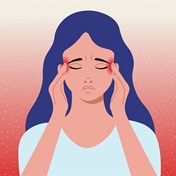Tobacco acts as a precipitating factor for headaches, specifically migraines. This is indicated in a study which shows that smokers have more migraine attacks and that smoking more than five cigarettes a day triggers this headache.
The influence of tobacco as a precipitating, non-causal factor of migraine attacks has produced contradictory data in scientific literature.
The limited research prior to the work published in the Journal of Headache and Pain indicated that smoking could improve migraines by reducing anxiety, one of the factors that triggers an attack.
"This study is groundbreaking in Spain as there are few studies on this topic, and all are very biased. This is due to the complexity and need for prior training of the participants", said Julio Pascual, one of the authors of this research and doctor at the Neurology Unit of Marqués de Valdecilla, University Hospital.
How the study was done
One advantage of this study is that the sample used, 361 medicine students from the University of Salamanca, were fully aware what a migraine was.
The experts, who enquired about the presence or absence of migraine (and its characteristics) and whether or not they smoked, guaranteed the reliability of the results obtained, as most surveys for this type of study are done over the phone, randomly and in people without knowledge of the illness.
The results show that 16% of students fulfilled migraine criteria, while 20% smoked. The percentage of smokers was higher (29%) in those who were also migraine sufferers. Migraine frequency in those students who were migraine sufferers and smokers was clearly higher than in those who were non-smokers and migraine sufferers.
According to Pascual, "smoking is a precipitating factor of this type of headache, as the prevalence of active smokers is one third higher in migraine sufferers, and there is a direct relationship between the number of cigarettes consumed and the frequency of migraine attacks".
The researchers stressed the importance of the dosage. The results of the interviews reveal that the migraine sets in after five daily cigarettes. Furthermore, although the percentage of those who smoked was higher in people with migraines, they smoked less than those who did not suffer migraines.
Migraine cure sometimes becomes the cause
"This is because they themselves knew that if they exceeded five cigarettes a day, they were more likely to have a migraine attack. The pain itself acts as a limiting factor", explains the neurologist, who maintains that "in no case should a migraine sufferer be advised to smoke thinking that it is going to improve their migraines. What's more, if you smoke a lot you should reduce the dose drastically".
"The supposed migraine cure ends up becoming its cause because of self-medication," Feliu Titus, an honorary member of the Spanish Neurological Society, explained in the paper Migraine treatment. The role of non-pharmacological methods, in Barcelona.
In Spain, this illness affects five million people, and 2% of the population suffers attacks for more than 15 days a month. According to Titus, "more than 20% have never consulted a specialist".
Ninety percent of migraine sufferers self-medicate, without being aware of the risk that this entails. Anyone who suffers from migraines and abuses drugs ends up suffering adverse effects, and a worsening of the illness due to a "rebound effect", according to specialists.
Hyper excitability has a genetic basis
Chronic headaches are a separate illness and one of the most frequent chronic diseases. Although the causes are still not clear, in some migraine cases it is already demonstrated that there is a genetic basis. In fact, most patients with migraines have a history of it in their family.
"Nowadays it is believed that migraines are a state of hyper excitability of the neurons that control headaches. Migraine sufferers are born with ion channels in the membrane of the neurons which are much more permeable and excitable. The brain of migraine sufferers is therefore able to link an attack with precipitating stimuli such as tobacco", Julio Pascual concludes.
To a large extent, the cause of this hyper excitability has a genetic basis. In fact, some specific mutations are already known to be responsible for the hyper excitability of these membrane ion channels. – (EurekAlert, June 2009)
Read more:
Migraines linked to brain lesions
Acupuncture eases migraines




 Publications
Publications
 Partners
Partners














